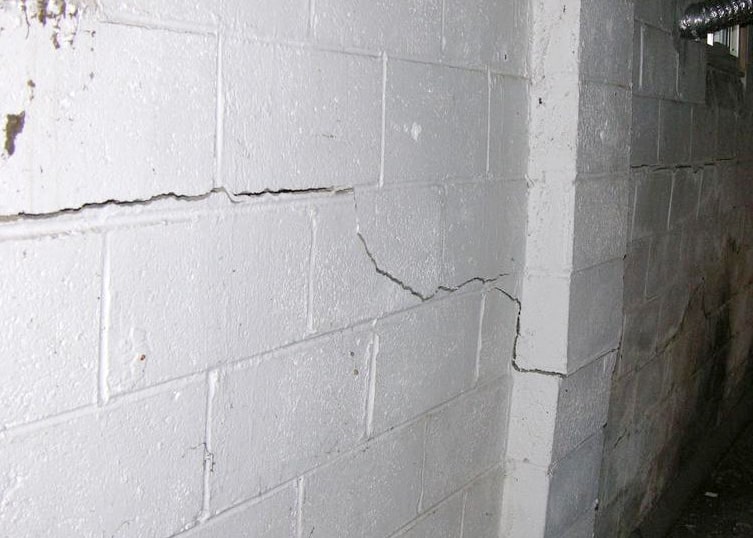If you’ve received a Home Inspection Report indicating potential structural issues with a foundation wall cracking, have one of our engineers inspect it further. As a home seller or a buyer, a cracking foundation can indicate structural issues you’ll need to understand. Penn Valley Engineering can perform a structural exam of your home and provide a detailed report.
In this particular case, a home located in Camden County, New Jersey, the main perimeter foundation walls of the basement section were originally constructed with cast-in-place concrete. The walls were viewable from the basement level. There were several visible cracks observed on each of the perimeter foundation walls. Some of the cracks exhibit water stains from leakage. However, they were dry at the time of our inspection.
Cause for Foundation Wall Cracking
These types of cracks (in this structural inspection) are caused by shrinkage of the material during the drying phase (curing) of the wet concrete placed during the original construction. They typically occur within the first 30-60 days following the placement of the concrete and normally do not pose a significant structural issue. Water leakage can occur, as was observed here, but it appeared to be aged and not active at this time.
We recommended the home seller & potential buyer monitor this condition for signs of water leakage in the future. Should leaks occur, a further evaluation may be warranted.
The typical repair when a basement foundation wall cracks show water leakage is to inject a hydrophobic polyurethane expansive foam sealant system into the crack under pressure to prevent further leakage.

Other Examples of Foundation Wall Cracking
Due to the huge amount of weight your home must support, cracks discovered in a foundation’s walls are not that uncommon. Knowing why and how they formed is important and can help determine what to do when they appear. A structural engineering inspection performed by PVE will provide the next steps for you to take.
Here are a few common causes of foundation wall cracks:
- Construction Procedures – undersized footings; poorly mixed concrete; inadequate soil compaction
- Setting Foundation – natural shifting soil; water erosion
- Pressure Changes of the Ground – extreme wet/dry shrink or expand; tree roots
The type of crack can also help determine the severity of the foundation wall cracking. Some are much more serious than others. Our licensed professional engineers can determine the cause and the severity while inspecting your foundation walls. Fill out our contact form, and include a visual description of what you see. Here are some of the common cracks found:
- Vertical or Horizontal Cracks
- Diagonal Cracks
- Stair Step Cracks
- Hairline to Significant Cracks
Other Indicators of Foundation Issues
Not all foundation issues can be seen easily. We can access areas of your home such as tight crawlspaces and basements. If you are experiencing any of these possible indications of foundation issues, have PVE take a look:
- Cracks in drywall or plaster
- Doors or windows that do not open/close smoothly
- Gaps in trim work
- Uneven flooring surfaces
While it is not always possible to avoid getting foundation wall cracks, here are a few things that can help prevent them:
- Keep gutters and downspouts clear
- Slope the landscape away from the home’s foundation
- Install exterior drains when necessary
- Limit lawn watering only when necessary
- Repair sprinkler system failures
- Avoid planting trees or shrubs near the house
- Repair non-structural cracks as they appear
Penn Valley Engineering Foundation Inspection
Structural cracks lessen the foundation’s integrity and require professional repair to keep the problem from developing further. If you’re unsure whether a crack in your foundation is structural or not, don’t take a chance. Call Penn Valley Engineering at (856) 872-3537. We have offices in Cinnaminson, NJ, Philadelphia, PA, and Brevard County, FL. We cover a wide service area and could very well be the structural engineer nearest you.
If the cracks in your foundation walls are non-structural, we can advise you how to fix them yourself with materials commonly found at a hardware store. If the cracks are more serious, we may be able to recommend a nearby contractor that specializes in fixing foundation wall cracks. Either way, PVE wants you to know your options and be safe!
